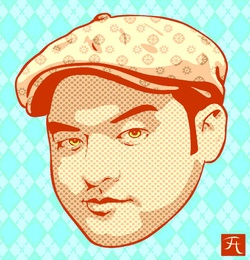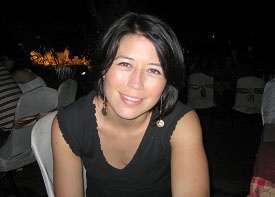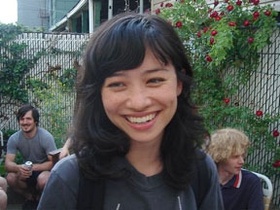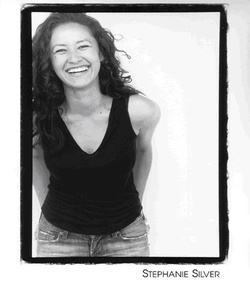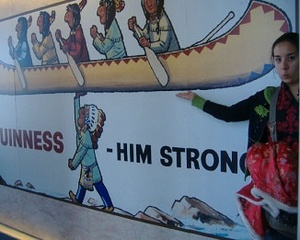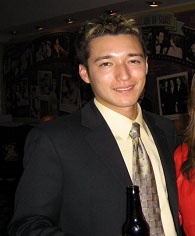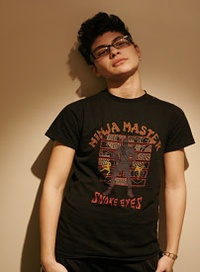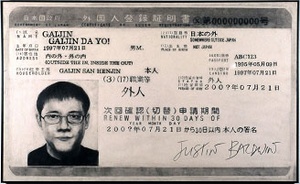“Hybrids are better”—Shayne Kao
For as long as I’ve lived here, New York City winters have put me into voluntary solitary confinement. December through March is a particularly bleak period when everyone in the city seems to be wearing only black, and I want to do nothing but crawl under my covers to avoid the oppressive buildings and empty expressions of those who pass me by on the dark and heinous streets at night. Even the purse Chihuahuas know that after the Holiday festivities are over, everything pretty much sucks. Any hint of an increase in temperature is a constant reminder that the sun needs to come out or there will soon be another suicide attempt at the Franklin Avenue station. But, that’s all over now because this year, winter seemed to melt directly into a lovely summer, and I too have decided to adapt to the drastic change in climate and hop on the happy train. In the belated honor of “LOVING DAY,” I’ve asked 10 hapas in NYC and beyond (including myself) the following: what we like about being biracial, and how it has shaped us in this world. So, let’s eat some good food and enjoy the sunshine as this community continues to grow and we find each other and ourselves among the masses!
Hapa Advantage #1: PERSPECTIVE
NAME: Teddy Hose
OCCUPATION: Illustrator, Animator, Graphic Designer
NATIONALITY: Dad is American (3rd Generation German), Mom is Japanese (straight from Japan).
TEDDY SAYS:
I definitely enjoy being biracial, it gives me perspective culturally, and I usually get a positive response when people ask me about it. I like the feeling of being unique because I work in the creative field where that is highly valued. I also believe it makes me more tolerant since the East’s values and tendencies are clearly different than the West. I can’t help but see things from more than one angle, which can be refreshing. I’m honestly able to communicate better with non-white people in my experience. Being able to connect with someone based on feeling “different” is always something I look for, as cliché as that sounds.
I think one advantage with being hapa is that we don’t have the typecasting that comes with being one race. Not to say there are those who equate mixed race people to one race (Obama being declared as the first “black” president), but this aspect is great for someone who’s an artist like me.
Hapa Advantage #2: COMMUNITY
NAME: Sharon Dowdell
OCCUPATION: I am a management consultant, but I am currently on leave of absence to help film a documentary about biracial identity and community.
NATIONALITY: My mother is Korean (born and raised there), and my father is Irish (his grandparents came to the US).
SHARON SAYS:
It astounds me when people get the misconception that the biracial experience is negative and depressing in its entirety. While I’d be lying if I said I haven’t faced some challenges in my own life, it certainly doesn’t sum up the whole of my experience.
When I moved to New York, I decided to create a social group for biracial and multiracial New Yorkers. I had gotten the idea when I was living in Korea and found a group for half-Koreans. Unfortunately, I found out about the group at the end of my 2 years there, but my experience at just one event made a considerable impression on me. There were only about 10 people at the event, but this was the largest gathering of people like myself I had ever been around. It made think about how I am so often the only biracial person in many situations, and what a contrast that is to most people who are so frequently among their own ethnicities. But more than anything, it really dawned on me how much I had in common with this small, cross-section of the population. There was an instant understanding that gave me the feeling of family and community that I had not experienced before. So when I moved to New York, I wanted to meet biracial people so I could have that sense of community in my new home city. I couldn’t quite find a group to join that catered to this, so I had to make my own. It has now been about a year and a half, and as I look back on the time, I just feel so touched when I think about all the great people I have met, and the impact that I feel we’ve had on each other’s lives.
* If you are biracial or multiracial, and would like to see what all this community business is all about, please join us at our next event! Check out our website for upcoming events: http://biracial.meetup.com/23/
HAPA ADVANTAGE #3: HYBRIDS ARE BETTER
NAME: Shayne Kao
OCCUPATION: Worked as an Event Manager for a little over a year until I was laid off this past Halloween (which wasn’t a bad thing since I hated it). Since then, I’ve taken on two internships in the hopes of gaining experience and getting a job that I actually like.
NATIONALITY: My dad is Chinese and my mother is of Irish descent.
SHAYNE SAYS:
Admittedly, I did attract some negative attention while growing up in a primarily Caucasian neighborhood, which led me to develop identity issues. Although I’m still grappling with ambivalence about being hapa, I’ve learned to somewhat embrace my dual ethnicity. Most of the time I feel proud of the fact that I’m not only white—I imagine myself almost more “advanced,” closer to what people will become in the future: a mishmash of so many races that any clear-cut ethnicity is no longer evident. I’ve even adopted the tagline hybrids (as in people, not cars) are better.
HAPA ADVANTAGE #4: THE IN-BETWEEN LIFE
NAME: Stephanie Silver
OCCUPATION: Actress
NATIONALITY: Half-Japanese, Half-German/Austrian/Hungarian—aka Germanese, or Double-Jap, or Jap-Squared, or the Axis Powers (minus Italy).
STEPHANIE SAYS:
I grew up with ramen and tempura dishes one week, and pastrami sandwiches and matzo ball soup the next. Which dessert do I like more: mochi or cheesecake? At a frozen yogurt shop, I don’t have to choose anymore. I can have both flavors, a twist, a blend, a hybrid!
Feeling a connection to two distinct cultures. Recognizing my features in an Expressionist painting, and my emotions in a woodblock print. Strangers telling me I should go to Israel, no Berlin, no…Okinawa. Remembering trips to Hawaii during Summer, and New York in the Fall. Learning to surf and going to Temple. Living the in-between life in Los Angeles. Being accepted by most Asian and Jewish groups and looking non-descript enough to pretend I was Latin or Creole to fit in there too. But feeling especially drawn to people with a similar mixed heritage. I had a deeper understanding with them and I was eager to find common ground.
I think seeing how one side of my family would ostracize one or the other of my parents made me embrace different ethnicities more. I’m constantly finding myself attracted to minorities. And I think their families are more accepting of me because of my mixed heritage. It’s as if I’m neutral territory, truly American. I could date Raymond, who is Korean, and his parents wouldn’t mind because I was only half-Japanese. My Japanese grandparents certainly would not feel the same about him. I could be considered as a potential wife for David and Daniel, both Jewish, simply because of my last name.
People are comfortable around me because I blend easily, but they’re curious too. I hear them saying to their friends with pride, “she looks Hawaiian, right, but her father’s Jewish!” I was born into something exciting and somewhat new. We’re a growing group of biracial mixes, foreign yet distinctly native. We’re the physical manifestation of the end of racism.
HAPA ADVANTAGE #5: TOLERANCE OF THE “STRANGE”
NAME: Jenn Dobucki
OCCUPATION: I’m a full-time student, and a full-time optical technician.
NATIONALITY: My father is Irish, Polish, German and Filipino. He grew up in California. My mother is Japanese, and had a Filipina grandmother. She grew up in Yokohama, spent her teen years in Mountain Province (north of Manila), and now lives in California.
JENN SAYS:
One of the best lessons I learned is that picking on someone for being different is one of the silliest and most arbitrary things you can do. I learned this from being the Asian cousin in a family of blondes, and the cousin who can only speak English to her Japanese grandfather. It’s those experiences as a biracial that has helped me become a much more accepting person, and I have so many wonderful friends because of it! I know so many interesting people, who usually get written-off for being strange, but knowing them has been very rewarding. I definitely feel unique and different, and my experiences have made me a very interesting person!
When you’re mixed, your life is different than the “norm,” and I believe this. Even if you don’t completely belong with one side of your family, or don’t completely fit into one culture, you can cross over between them. Since I don’t belong to a single group, I’m free to talk to anyone. Being a half-breed makes me feel like a diplomat, and that’s just fun. The best friends I’ve ever had share similar experiences, and there’s a great comfort in that. I have a level of understanding with another person that I might not have experienced if I had been born completely on one side of the fence. I’m happy that being mixed means I view the world through multiple lens, and the extra things I see are always so interesting.
HAPA ADVANTAGE #6: BEST OF BOTH WORLDS
NAME: Isaac Waters
OCCUPATION: As of now, I am working in Customer Service at Delta Airlines.
NATIONALITY: I am half-Japanese and half-Caucasian. My Dad was born in Ohio, and my mom is from Japan.
ISAAC SAYS:
I think of biracial as being privileged to have the best of both worlds. I am bilingual, so this has helped me make numerous friends that speak only one language, or both, and as a result, I have many friends here in the States, and in Japan. Being hapa also helped attract the attention of females, who like guys with an “exotic look,” or like being spoken to in another language. I enjoy being unique, speaking two different languages, and to experience two completely different cultures. I know many people who are very interested in my life, and wish they could have had the same experiences.
HAPA ADVANTAGE #7: SENSE OF SELF
NAME: Z.A. Martohardjono
OCCUPATION: I’m a filmmaker and currently in graduate school.
NATIONALITY: I am Indonesian-Italian-Welsh.
ZA SAYS:
Being mixed race has fundamentally shaped the way I think about things. As a young person, having a kind of subjective identity was a source of a lot of inner tension for me. I remember wanting so much to feel part of a well-defined group. Growing up in Queens, I saw how tight-knit communities gathered around race, ethnicity and shared cultural codes. I hated when people assumed or tried to guess at my ethnicity because they were never right. I wanted to be recognized as Asian, but very rarely was I read that way. After a certain point, my perspective shifted, and I realized I was indeed part of a group, a great majority of “others.”
As I got older and learned about the workings of racism, classism homophobia and gender oppression, my identity and my relationship to my body really solidified. I felt right with everything I have, everything that is me, and my contradictory parts just became part and parcel to what felt like home. I felt a closeness to people whose experience was living in bodies and identities that were complicated and differently perceived or defined in different contexts. Being aware that I would never exist within clean lines (despite whatever others perceived about me), and growing comfortable in my body, I came to an understanding that little is clear and clean about identity. Furthermore, identity can be manipulated and twisted to justify oppression, discrimination, even genocide.
I was never able to take my identity for granted and just not think about it, so this state of mind and my identity search really drew me to identity politics and social consciousness. Bonding with a lot of young activists of color made me realize that ambiguity, otherness, and complex self-understanding is really a gift, and, at best, a tool for community building and political empowerment. As my mind opened, my body also began to change and my boundaries grew more and more fluid. My understanding of my ethnic identity broke down the walls within my understanding of my gender identity. I feel most right in a body and identity that doesn’t fit clean lines.
It’s exciting to defy other people’s assumptions, whether or not they are ever aware of their misunderstandings. I definitely have my mixed, queer, trans-body to thank for a lot of knowledge and some deep human connections. And when I now think back to the frustrated child I was, (when I think of the little person who desperately craved a sense of belonging), I realize what I needed was broader and better-fitting choices and a little bit of time to find spaces to get comfortable in between and outside of the usual boxes.
HAPA ADVANTAGE #8: THE ROAD LESS TRAVELED
NAME: Justin Baldwin
OCCUPATION: Artist, but an unknown one, so I have a day job working for a Japanese company.
NATIONALITY: I am an American, as is my father. My mother is now a U.S. citizen, but was born in Japan. On my father’s side of the family, there is Irish, German, British, and who knows what else ... and, I suspect that on my mother’s side, there may be some Russian (going back a couple hundred years), since my mother has fair skin and green eyes (plus, she’s from Sapporo, and the prefecture of Hokkaido is closer to Russia than anywhere else in Japan).
JUSTIN SAYS:
Although I didn’t study Japanese until I finished college, the biracial factor inspired me to study Japanese and eventually live in Japan. This has subsequently made a profound impact/influence on who I am, and what I do. I suppose, in this sense, it has helped secure jobs (first with the JET Program, and then with the Kurashiki Board of Education, and now with my current corporate incarnation as a Professional Gaijin/Scapegoat). Being biracial in college helped me connect with Roger Shimomura as a student, who remains a close friend and mentor. So in many ways, even though being biracial has not always resulted in the most pleasant experiences, it has led me down avenues that I might not otherwise have taken, meeting new people and places that do end up being very beneficial and positive. Besides, as I mentioned, there’s a certain freedom to being undefined.
HAPA ADVANTAGE #9: DOUBLE NOT HALF
As I scroll through these responses, once again, I am overwhelmed with a simultaneous sense of comfort and disorientation. Entering my mid-20s, I’ve come to accept and embrace the positive effects of my ethnic background, by associating with and learning from the people mentioned in this article. I am learning quickly that my identity crisis/investigation is only a small fraction of a cultural search of where we, as biracial people, stand in this society. The importance of seeing the glass as half-full, as opposed to half-empty, is equal to seeing ourselves as double, rather than “half” of two races. In many ways, we are lucky and unsheltered. I am excited to see how this perspective continues to grow, as I meet more and more of you and hope to strengthen our voice in any and every way possible.
© 2009 Leah Nanako Winkler


